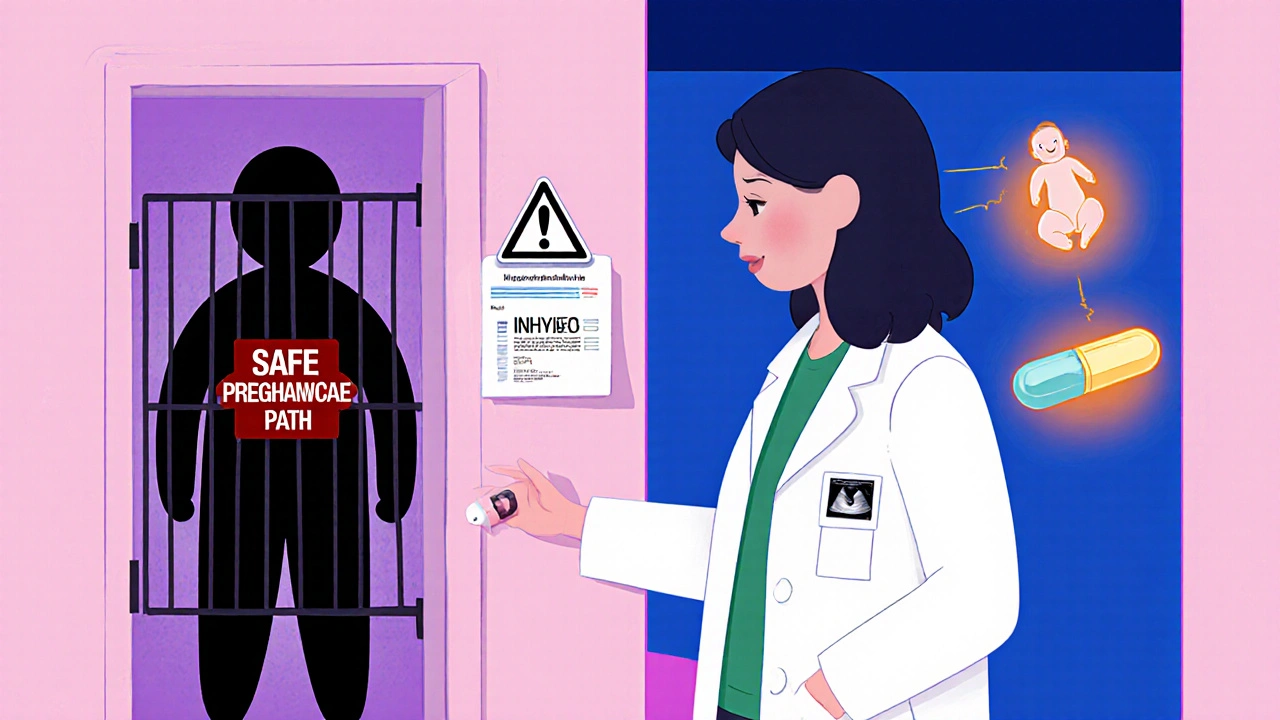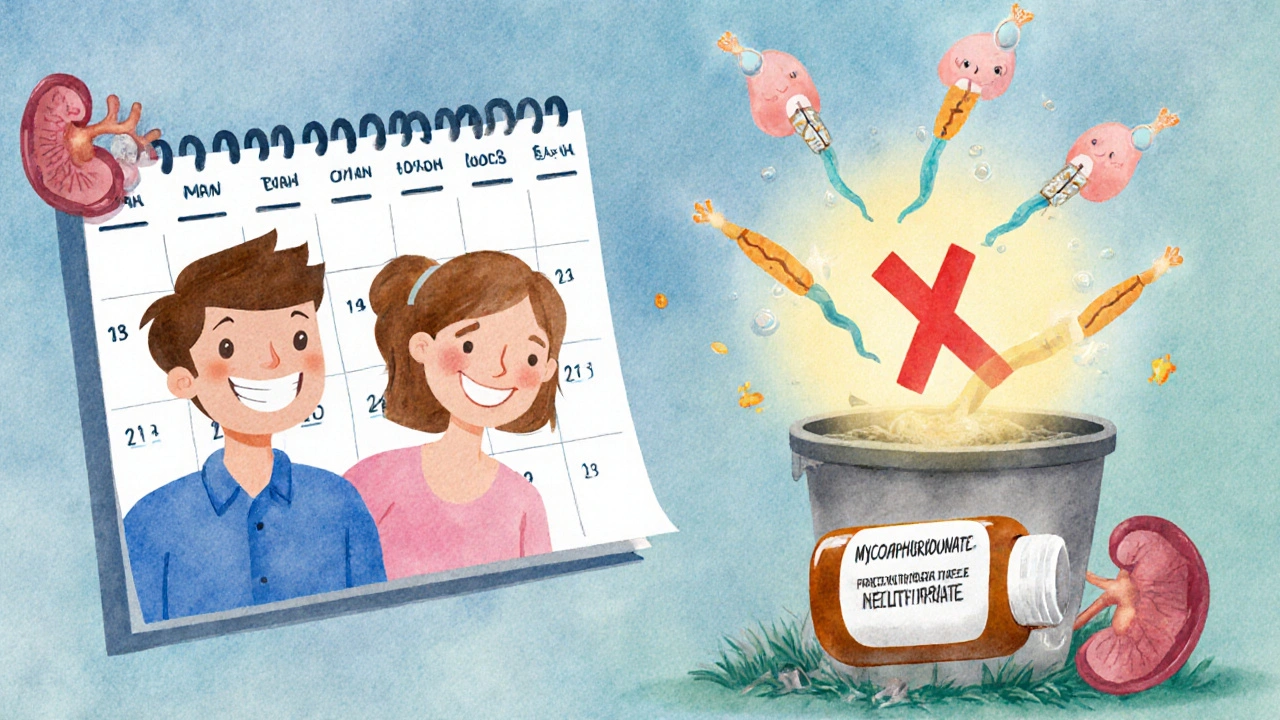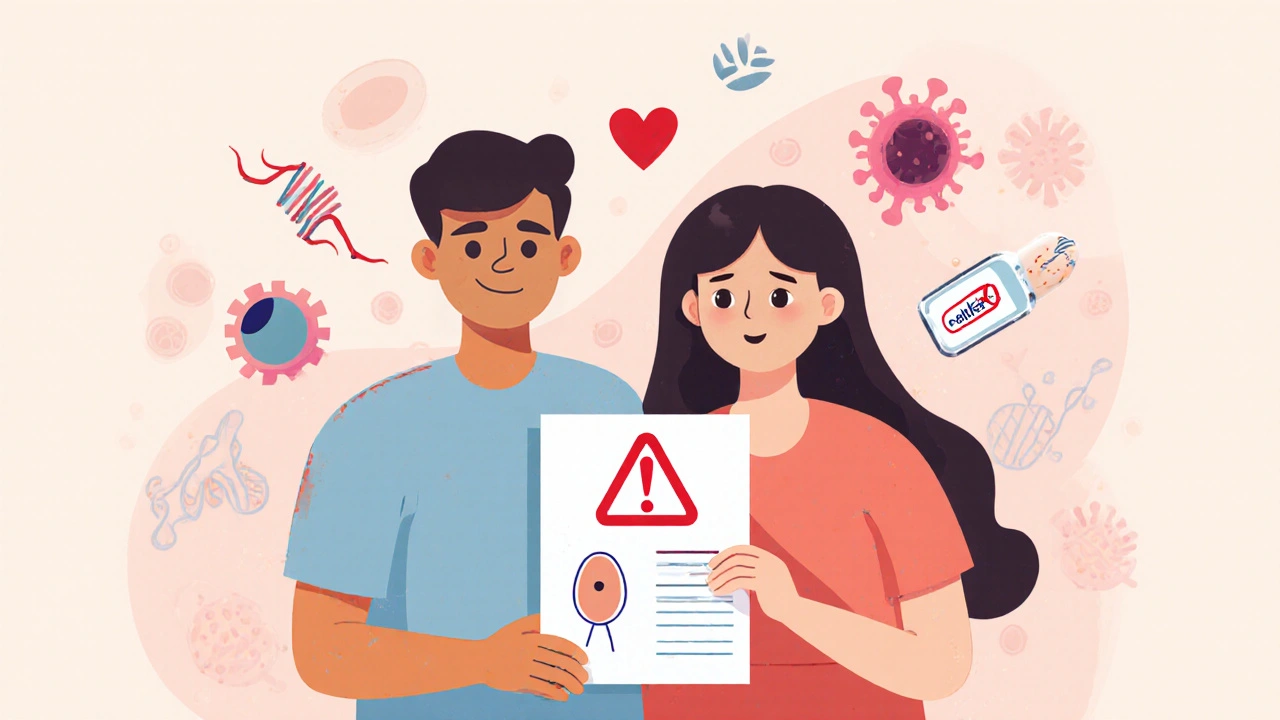If you're taking mycophenolate mofetil and thinking about starting a family, you're not alone. Thousands of people on this medication wonder if it’s safe to get pregnant-or if it could affect their ability to have children. The truth is complicated, but it’s not something you should guess about. Mycophenolate mofetil, sold under brand names like CellCept, is a powerful immunosuppressant used after organ transplants and for autoimmune diseases like lupus and vasculitis. But it’s also one of the most dangerous drugs you can take if you’re trying to conceive-or already pregnant.
What Mycophenolate Mofetil Does to Your Body
Mycophenolate mofetil works by stopping immune cells from multiplying. That’s great if your body is attacking a transplanted kidney or your own joints in rheumatoid arthritis. But it doesn’t care if those cells are part of your immune system or your reproductive system. It hits them all. The drug blocks an enzyme called inosine monophosphate dehydrogenase, which is needed for DNA synthesis. Fast-dividing cells-like those in a growing embryo-get hit hardest.
This isn’t theoretical. Studies from the FDA and European Medicines Agency show a clear pattern: women who get pregnant while taking mycophenolate mofetil have a much higher chance of miscarriage and birth defects. These include cleft lip and palate, underdeveloped ears, heart problems, and missing fingers or toes. One large study published in Arthritis & Rheumatology in 2021 found that nearly 25% of pregnancies exposed to mycophenolate ended in miscarriage or severe malformation. That’s five times higher than the general population.
Does It Affect Male Fertility?
Most people focus on women, but men taking mycophenolate mofetil need to pay attention too. While the drug doesn’t cause permanent infertility, it can lower sperm count and reduce sperm quality. A 2020 study in the Journal of Transplantation tracked 87 men on mycophenolate for at least six months. About 40% had lower-than-normal sperm concentration. Some had abnormal sperm shape or reduced movement. The good news? These changes usually reverse after stopping the drug-typically within three to six months.
Still, if you’re trying to get your partner pregnant, you shouldn’t wait. Sperm takes about 74 days to fully develop. If you’re on mycophenolate, even a few months of exposure could mean damaged sperm is still around when conception happens. That’s why doctors recommend stopping the drug at least three months before trying for a baby-no matter your gender.
What If You’re Already Pregnant?
If you find out you’re pregnant while on mycophenolate mofetil, don’t panic. But don’t delay either. Call your doctor immediately. Stopping the drug suddenly can be risky if you’ve had a transplant-your body might reject the organ. But continuing it carries serious risks to the baby.
Your medical team will need to weigh two dangers: the risk of transplant rejection versus the risk of birth defects. In many cases, doctors switch patients to safer alternatives like azathioprine. Azathioprine has been used for decades in pregnant transplant patients and carries a much lower risk to the fetus. It’s not perfect-there’s still a small chance of low birth weight or preterm delivery-but it’s far safer than mycophenolate.
Ultrasounds and specialized genetic testing (like detailed anatomy scans and amniocentesis) will be offered to check for abnormalities. These aren’t just routine-they’re critical when you’ve been exposed to this drug.

Birth Control Is Non-Negotiable
If you’re a woman of childbearing age and taking mycophenolate mofetil, you must use two forms of birth control at the same time. One pill, one condom. One IUD, one barrier method. This isn’t a suggestion-it’s a requirement from the FDA and every major transplant center in the U.S.
Why two? Because birth control can fail. Even if you think you’re careful, human error happens. One study found that nearly 1 in 5 women on mycophenolate who were told to use birth control still got pregnant. Many didn’t realize the drug was dangerous. Others thought their period was late because of stress-not pregnancy.
Doctors will often require a negative pregnancy test before starting the drug, monthly tests while you’re on it, and another test after you stop. Some clinics even require signed consent forms acknowledging the risks. It’s not being overcautious-it’s protecting lives.
What About After Stopping the Drug?
Once you stop mycophenolate mofetil, your body clears it quickly. The half-life is about 13 hours, so most of it is gone in a day. But your reproductive system needs more time to recover.
For women, it’s recommended to wait at least six weeks after stopping before trying to conceive. That gives your ovaries time to reset. For men, three months is the standard. That’s how long it takes for new, healthy sperm to fully develop.
Some people worry about long-term damage. The good news? There’s no evidence mycophenolate causes permanent infertility. Fertility returns after the drug leaves your system. One 2022 follow-up study of 120 women who stopped mycophenolate to get pregnant showed that 89% conceived within a year-similar to the general population.

Alternatives to Mycophenolate Mofetil
If you’re planning a pregnancy, your doctor might switch you to a safer immunosuppressant. Azathioprine is the most common alternative. It’s been used safely in pregnant transplant patients for over 30 years. Cyclosporine and tacrolimus are also options, though they come with their own risks-like high blood pressure or gestational diabetes.
There’s no perfect drug. But azathioprine has the best safety profile for pregnancy. It doesn’t cross the placenta as easily, and long-term studies show no increase in birth defects. Your doctor will monitor your blood levels closely to make sure your immune system stays under control.
Some patients worry that switching drugs will cause rejection. But studies show that when done properly-with gradual tapering and close monitoring-switching to azathioprine before conception doesn’t increase transplant failure rates.
What to Do Next
If you’re on mycophenolate mofetil and thinking about having kids, here’s what to do:
- Don’t stop the drug on your own. Stopping suddenly can lead to organ rejection or disease flare.
- Schedule a meeting with your transplant specialist or rheumatologist. Bring up your plans to conceive.
- Ask about switching to azathioprine or another safer option.
- Use two forms of birth control until you’re officially off mycophenolate and have waited the recommended time.
- If you’re male, get a semen analysis before trying to conceive-it’s a simple blood test that can show if sperm quality has been affected.
- Work with a high-risk OB-GYN if you become pregnant.
This isn’t about fear. It’s about control. You don’t have to give up your dream of parenthood. You just need a plan.
Frequently Asked Questions
Can mycophenolate mofetil cause permanent infertility?
No. Mycophenolate mofetil does not cause permanent infertility in men or women. Sperm and egg production typically return to normal after stopping the drug. Men should wait three months after stopping before trying to conceive. Women should wait at least six weeks. Fertility rates after stopping are similar to those of people who never took the drug.
Is it safe to take mycophenolate mofetil while breastfeeding?
It’s not recommended. Mycophenolate passes into breast milk in small amounts. While there’s no proven harm to infants, the risk isn’t fully understood. Most doctors advise against breastfeeding while on this drug. If you want to breastfeed, talk to your doctor about switching to a safer alternative like azathioprine first.
How long after stopping mycophenolate can I get pregnant?
Women should wait at least six weeks after stopping mycophenolate mofetil before trying to conceive. Men should wait three months. This allows time for the drug to fully clear and for new, healthy sperm or eggs to develop. Waiting longer is fine-if you’re ready, go ahead.
Can I take mycophenolate mofetil if I’m already pregnant?
No. If you’re pregnant and taking mycophenolate, contact your doctor right away. Continuing the drug increases the risk of miscarriage and serious birth defects. Your doctor will likely switch you to azathioprine or another safer medication as soon as possible. Never stop or change your dose without medical guidance.
Do I need to use birth control if I’m on mycophenolate but not planning to get pregnant?
Yes. If you’re a woman of childbearing age, you must use two forms of birth control at the same time. This is not optional. Even if you think you’re not fertile, or your periods are irregular, pregnancy can still happen. Mycophenolate is extremely dangerous to a developing fetus. Birth control isn’t just a precaution-it’s a requirement for your safety and the baby’s.


This post is a godsend. I’ve been on CellCept for 7 years after my kidney transplant and I was terrified to even think about kids. Now I know it’s not a death sentence for fertility-just a damn serious countdown clock. Three months for me, six weeks for her, and we’re golden. I’m scheduling that semen analysis next week. Thanks for the clarity.
How quaint. You’ve reduced a complex pharmacological interaction to a checklist. One must wonder-do you truly comprehend the epistemological weight of immunosuppression on gametogenesis, or are you merely regurgitating FDA pamphlets? The notion that ‘fertility returns’ is a reductive fairy tale. The body is not a light switch. It is a symphony of molecular chaos, and to presume it resets like a smartphone is the height of Cartesian hubris.
OMG I JUST FOUND OUT I’M PREGNANT AND I’M ON MYCOPHENOLATE AND I’M SCARED TO DEATH 😭😭😭 I DIDN’T EVEN KNOW THIS WAS A THING I THOUGHT MY PERIOD WAS LATE BECAUSE OF STRESS AND NOW I’M CRYING IN THE BATHTUB AND MY HUSBAND IS PANICKING AND I JUST WANT TO KNOW IF THE BABY WILL BE OKAY OR IF I’M GOING TO LOSE IT OR IF I’M GOING TO BE A MONSTER MOM 😭😭😭
Thank you for this meticulously researched and compassionate overview. The clarity with which you’ve presented the clinical data, paired with the emphasis on patient autonomy and proactive planning, is profoundly reassuring. It is imperative that individuals under immunosuppressive regimens are not merely informed, but empowered. Your guidance offers not just hope, but a structured pathway forward. With gratitude, and utmost respect for the medical team behind these protocols.
Wow. I’m from India and I never even knew this drug could affect fertility like this. My cousin is on it for lupus and she’s been trying to get pregnant for 2 years. She thought it was ‘just infertility’-now she knows it’s the meds. I’m sending her this right away. Also, two forms of birth control? That’s actually smart. In my country, people think one pill is enough. No wonder so many unplanned pregnancies happen with these drugs. This needs to be shouted from the rooftops.
So let me get this straight. You’re telling me I have to wait 3 months after stopping this drug to try for a baby? But I’ve been on it for 5 years and my wife and I are 37. We don’t have time for this. Can’t I just roll the dice? I mean, my cousin’s kid was born with a cleft lip and he’s now a pro soccer player. Maybe it’s not that bad?
Thank you for this comprehensive and deeply responsible exposition. The emphasis on dual contraception is not merely prudent-it is ethically non-negotiable. I have shared this with my entire autoimmune support group. The statistical risks are staggering, yet the path to safe conception remains attainable with diligence. This is precisely the kind of patient-centered science we need more of.
the drug blocks inosine monophosphate dehydrogenase which is needed for dna synthesis so fast dividing cells get hit hardest like embryos and sperm and eggs but its not permanent so stop it and wait 3 months for men 6 weeks for women its not that hard really like just dont be dumb and use two forms of birth control like the doc says and switch to azathioprine if you wanna get preg and dont panic if you already are just call your doctor dont google it
I’m so glad someone finally laid this out without fearmongering. I’ve been on this drug for 12 years after my heart transplant, and I’ve had two friends who lost babies because they didn’t know. I’ve been using two forms of birth control since I was 21, and I’ve been talking to my doc about switching to azathioprine for years. I just had my last negative pregnancy test last week-I’m officially off mycophenolate. I’m waiting the full 3 months, but I’m already planning our baby shower. It’s not about giving up-it’s about choosing the right time. You can still have a family. You just have to be smart about it.
My doctor never told me any of this. I’m 28, on CellCept for lupus, and I thought I was just ‘having trouble conceiving’-turns out I was trying with damaged sperm. I got a semen analysis last month and my count was half of normal. I’ve been off the drug for 45 days now. I’m gonna wait the full 3 months. I’m scared but I’m ready. Thank you for making me feel like I’m not alone in this. I’ll update when I’m pregnant.
What about long-term effects on the child after birth? Are there any studies tracking developmental outcomes in kids exposed to mycophenolate in utero but who survived? I’m not asking because I’m planning to get pregnant-I’m asking because I know someone who did, and the child has mild speech delays. Is that a coincidence or part of the pattern?